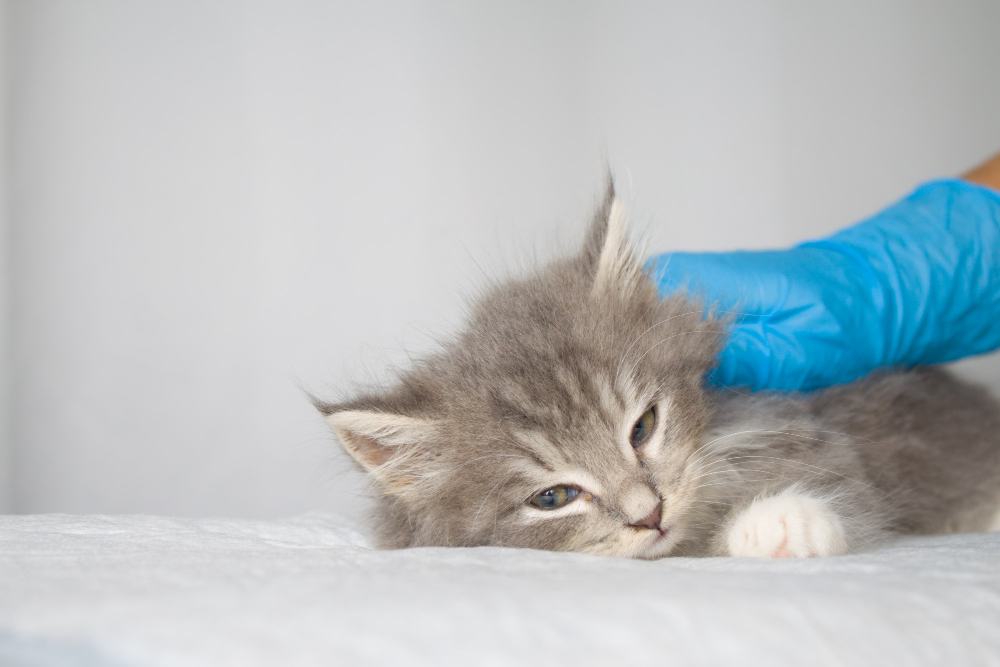Cats, as enigmatic as they may be, often have a way of hiding their pain and discomfort, leaving their human companions in a state of worry and confusion. In this article, we will address the questions that arise when you notice that my cat is not well, explore cat unwell signs, discuss the peculiar behavior of a cat staring at wall sick, and provide guidance on what to do when my kitten has been sick. We will also delve into some common questions about cats and their end-of-life behaviors, such as whether they know they’re dying and if they prefer to be alone during their final moments. Our aim is to help you recognize the signs and symptoms of an unwell or dying cat, provide insights on feline behavior and health, and offer guidance on how to best support your feline friend.
My Cat is Not Well – Understanding the Symptoms
When you notice that my cat is not well, it’s essential to understand the various symptoms that can indicate that a cat is unwell. These symptoms may include lethargy, vomiting, loss of appetite, and changes in behavior. Cats are notorious for hiding their pain, so it’s crucial to pay close attention to any changes in their demeanor or routine. Regular check-ups with your veterinarian and monitoring your cat’s health will help you catch any issues early on and provide the appropriate care.
Cat Unwell Signs – What To Look For
Some cat unwell signs might indicate a more serious illness or condition, such as difficulty breathing, seizures, or unresponsiveness. If you observe any of these symptoms in your cat, it’s essential to consult your veterinarian immediately. They can assess your cat’s condition and provide appropriate treatment, ensuring your furry friend receives the best possible care.
My Kitten Has Been Sick – What To Do Next
If you find that my kitten has been sick, it’s important not to panic. Kittens, just like adult cats, can experience illnesses from time to time. It’s crucial to provide them with a clean, comfortable environment and ensure they have access to fresh water. Keep a close eye on their condition, and don’t hesitate to seek advice from your veterinarian even if the symptoms don’t seem severe. Early intervention can make a significant difference in your kitten’s recovery, as their immune systems are not as strong as those of adult cats. By addressing any health concerns promptly, you’ll be helping to safeguard the well-being of your furry little companion.
Cat Staring at Wall Sick – Strange Behaviors
A cat staring at wall sick can be a puzzling sight, leaving many cat owners wondering if this behavior is a sign of illness or simply a harmless quirk. Cats may stare at walls for various reasons, ranging from boredom to a response to sounds or vibrations that humans can’t perceive. While this behavior might not necessarily indicate sickness, it’s essential to keep an eye on your cat and monitor for any additional symptoms or changes in their overall health. To prevent boredom and potential behavioral problems, ensure your cat’s environment is enriched with stimulating toys, perches, and scratching posts that cater to their natural instincts and curiosity. By providing a mentally and physically engaging environment, you can help minimize the chances of your cat developing unwanted behaviors and keep them happy and healthy.
Do Cats Know They Are Dying? – Feline Intuition
The question of whether cats know they are dying is one that has intrigued researchers and cat lovers alike. While definitive answers remain elusive, anecdotal evidence and expert opinions suggest that cats may have some awareness of their impending demise. This awareness could manifest through changes in their behavior, such as seeking solitude or becoming more affectionate towards their human companions.
What Do Cats Do Right Before They Die? – Recognizing the Signs
Recognizing the signs of a dying cat can help you provide comfort and support during their final moments. Some behaviors and symptoms that might indicate a cat is nearing the end of its life include hiding, vocalizing, or becoming unresponsive. Cats may also experience a decline in their grooming habits, have difficulty eating or drinking, or exhibit labored breathing. It’s essential to keep a close eye on your cat’s condition and consult your veterinarian for guidance on providing the best possible care during this time.
How Do I Know if My Cat is Suffering? – Assessing Your Pet’s Quality of Life
Determining if your cat is suffering or in pain can be challenging, but there are several indicators to consider. Changes in your cat’s behavior, such as increased vocalizations, restlessness, or hiding, may signal that they are in pain. Additionally, physical symptoms like weight loss, loss of appetite, or difficulty moving can also be signs of suffering. If you suspect your cat is in pain, consult your veterinarian for advice on providing appropriate palliative care and managing their discomfort.
Do Cats Want To Be Alone When Dying? – Feline Preferences and Comfort
The question of whether cats want to be alone when dying is a complex one, and the answer may vary from one individual to another. Some cats may seek out solitude during their final moments, while others may prefer to be close to their human companions. To provide comfort and support to a dying cat, pay attention to their cues and preferences, offering them a quiet, comfortable space to rest and ensuring they have access to fresh water and a clean litter box. If your cat seems to desire companionship, be there for them, offering gentle petting and reassurance.
Conclusion
Recognizing the signs of an unwell or dying cat is crucial to providing the best possible care for your feline friend. By closely monitoring your cat’s health and behavior and seeking veterinary advice when necessary, you can help ensure your cat lives a comfortable, healthy life. Remember, if you notice any changes in your cat’s behavior, such as my cat is not well, observe cat unwell signs, or witness your cat staring at wall sick, it’s essential to address these concerns promptly. Lastly, when dealing with a sick kitten, remember that my kitten has been sick is a call to action for seeking veterinary guidance and providing the appropriate care.

